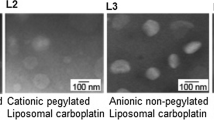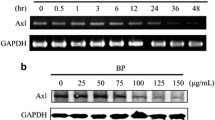Abstract
Purpose: Carboplatin has shown promise experimentally as an antineoplastic agent against both primary central nervous system (CNS) tumors and several solid tumors that frequently metastasize to the brain. Unfortunately, carboplatin is limited in its clinical use for tumors in the CNS by systemic toxicity and poor penetration through the blood–brain barrier. Recent advances in polymer technology have made feasible the intracranial implantation of a biodegradable polymer capable of local sustained delivery of chemotherapy for brain neoplasms. This study assessed the toxicity and efficacy of carboplatin delivered from intracranial sustained release polymers in the treatment of experimental gliomas in rodents. Methods: Two biodegradable anhydride polymer systems were tested: a copolymer of 1,3-bis-(p-carboxyphenoxy propane) and sebacic acid, and a copolymer of fatty acid dimer and sebacic acid. The polymers were loaded with carboplatin and dose escalation studies evaluating toxicity were performed by implanting carboplatin-loaded polymers into the brains of rats. Next, efficacy was tested. F-98 glioma cells were injected intracranially into rats, and 5 days later polymers containing the highest tolerated doses were implanted at the site of tumor growth. The survival of animals receiving carboplatin-loaded polymer was compared with that of animals receiving intraperitoneal doses of the same agent. Results: Carboplatin-polymer was well tolerated at doses up to 5% loading in both polymer systems. Locally delivered carboplatin effectively prolonged survival of rats with F98 gliomas. Maximal treatment effect was seen with 5% loading of either polymer, with median survival increased threefold over control (P<0.004). Systemic carboplatin also significantly prolonged survival, but the best intracranial polymer dose was significantly more effective than the best systemic dose tested. Conclusions: Carboplatin can be safely delivered intracranially by biodegradable sustained-release polymers. This treatment improves survival in rodents with experimental gliomas, with locally delivered carboplatin being more effective than systemic carboplatin.
Similar content being viewed by others
Author information
Authors and Affiliations
Additional information
Received: 25 August 1995/Accepted: 21 February 1996
Rights and permissions
About this article
Cite this article
Olivi, A., Ewend, M., Utsuki, T. et al. Interstitial delivery of carboplatin via biodegradable Polymers is effective against experimental glioma in the rat. Cancer Chemother Pharmacol 39, 90–96 (1996). https://doi.org/10.1007/s002800050542
Issue Date:
DOI: https://doi.org/10.1007/s002800050542




